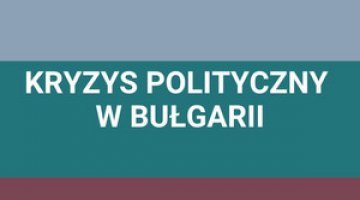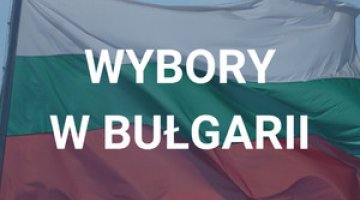Political turmoil after the parliamentary elections in Bulgaria
The campaign and the election results
The main themes of the election campaign were social issues and how to improve living standards. Bulgaria is the poorest country in the EU; one in five people live below the poverty line (set at €145 per person per month). During the campaign, GERB was trying to emphasise that it was the only party which could guarantee the implementation of sound economic policies; they argued that despite the economic crisis during their time in office, theyimproved the absorption of EU funds, achieved an expansion of infrastructure, and increased support for farmers. The other elected parties made much more populist promises; for example, the BSP promised to raise the minimum wage and pensions, and to increase taxation of the rich.
However, the parties’ political programmes were quickly overshadowed by mutual accusations and charges of attempted electoral fraud. In early April, the prosecutor’s office opened an investigation into the illegal wiretaps of many public figures (the president, members of the government and businessmen) by the Ministry of Internal Affairs during the GERB government. The Socialists stressed that this was further evidence of the creation by the Borisov regime of a “police state”, while the ruling party took the whole matter as a provocation, and for its part recalled a number of corruption scandals during the socialists and the DPS’ period in government. The day before the vote, 350,000 illegal ballots were seized at a printer’s office owned by a GERB member. The state prosecutor’s office announced an investigation, but initially did not give many details. Borisov’s party has portrayed these actions as an attempt to destabilise the country and harm their chances on election day.
GERB’s decision to call early elections was a smart move, not only because it helped to calm the protests, but also for the party to get a very good result in the elections. GERB is the only party in Bulgarian democratic history which has topped the polls in two consecutive elections, and it now holds 97 seats (in the 240-seat parliament, 121 seats constitutes a majority). Compared to previous elections, the Bulgarian Socialist Party’s representation in parliament has doubled (to 84 seats), but like GERB it will be unable to rule alone. In comparison to previous elections, the Movement of Rights and Freedoms (36 seats) and Ataka (23 seats) have almost maintained the same numbers in parliament, but the latter party led a much more effective campaign, as before the protests began support for it had been hovering around 1%. The right-wing and protest parties that rode the wave of the February demonstrations were unsuccessful. Closest to passing the 4-percent electoral threshold were the nationalist Bulgarian National Salvation Front; the centre-right grouping led by former EU Commissioner Meglena Kuneva; and the right-wing group of former Prime Minister Ivan Kostov, which has its roots in the anti-communist opposition. However these three groups, plus a number of various environmental, leftist and nationalist parties, managed to attract a significant number of votes – 24% in total. In addition to the relatively low overall turnout (51%), this is evidence of considerable public disillusionment with the current political class.
Prospects for the formation of a ruling coalition
Neither of the two main political parties, GERB or BSP, are in a position to form a government, and they will have to seek coalition partners. Theoretically, GERB is in a better position to hold negotiations than BSP, since they need the support of only one other party to form a government. However, Borisov’s party is still deeply politically isolated, and it is almost certain that he will be unable to overcome the aversion of the other party leaders. The Turkish-minority grouping has traditionally formed coalitions with the socialists, and is very reluctant to ally with GERB, and so Borisov’s party could therefore only seek an alliance with Ataka. The chances of this are, however, very small, due to the radical party’s consistent demand to renew the joint construction with Russia of the nuclear power plant in Belene, as well as to nationalise the electricity distribution companies – demands that are unacceptable for GERB.
Most likely is a government built around the BSP. The traditional ally of the socialist group is the Turkish-minority DPS party, but both groups combined have a total of 120 seats – that is, one less than the required majority. The Socialists will therefore try to bring about a split in the GERB, or (much more likely) find a formula for cooperation with Ataka, a party known for its virulently anti-Turkish rhetoric. One solution could be the establishment of a ‘programme government’, in which the main party leaders would not participate; this would mitigate the tension between DPS and Ataka. The scenario of a ‘technical government’ was made more likely by a statement from the BSP’s leader Sergey Stanishev that he would not head the new government, and will not give up his post as President of the Party of European Socialists in the European Parliament.
It cannot be ruled out that the coalition talks will end in deadlock, leading to yet more early elections, as there are a number of differences between the BSP, DPS and Ataka, and these parties are mainly linked by a reluctance to team up with Borisov. However at this stage, the more likely scenario is the creation of a transitional ‘programme government’. This would allow the parties supporting such a government to gain popularity from the expected easing of fiscal policy, focus their efforts on discrediting GERB, and prepare for the next round of elections (which could, for example, be held together with elections to the European Parliament in 2014).
Conclusions
These elections have not brought about any breakthrough on the Bulgarian political scene. The main reason for this is the public’s dissatisfaction with the entire political class, combined with the inability of the movement of discontented Bulgarians to create a reliable alternative to the existing political parties. A very high proportion of votes were cast for parties that did not enter parliament; this will deepen the problem of the current political class’s lack of legitimacy. Any new government formed as a result of coalition talks – no matter what shape it eventually takes – will be weak and rather unstable. It will probably also depend on the support of Ataka, which may adversely affect the Euro-Atlantic course of Bulgarian foreign policy, as well as the climate for foreign investment.



